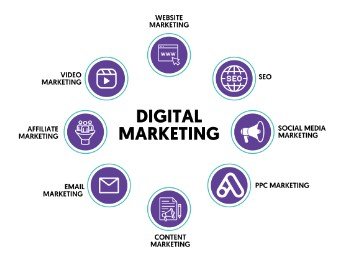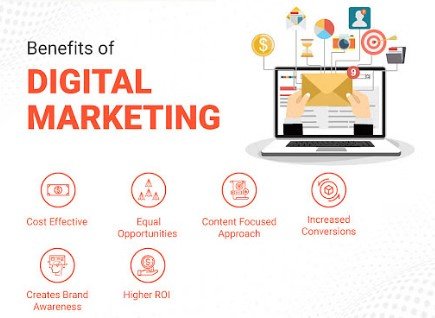Welcome to the world of digital marketing! If you want to take your business to the next level, you’ve come to the right place. This guide will show you how to attract customers online, boost your brand, and drive sales. Get ready to unlock explosive growth with our ultimate guide to digital marketing!

What is Digital Marketing?
Digital marketing uses online channels to reach and engage customers. It includes SEO, content marketing, social media, email marketing, PPC advertising, and more. Unlike traditional marketing, digital marketing allows you to target specific audiences, track performance, and adjust your strategies in real-time. It’s a powerful way to grow your business in the digital age.
Why Digital Marketing Matters
Today, more people shop and search for information online. This shift means businesses need a strong online presence to stay competitive. Digital marketing helps you connect with customers where they spend their time: on search engines, social media, and email. It’s cost-effective, measurable, and scalable, making it an essential tool for businesses of all sizes.

Key Components of Digital Marketing
1. Search Engine Optimization (SEO)
SEO is about improving your website so it ranks higher in search engines like Google. Higher rankings mean more visibility and traffic. Here are some SEO best practices:
- Keyword Research: Find keywords your audience uses. Tools like Google Keyword Planner and SEMrush can help.
- On-Page SEO: Optimize your website’s content and HTML. Include keywords in titles, meta descriptions, and headings.
- Content Quality: Create valuable, relevant content. High-quality content attracts visitors and earns backlinks.
- Technical SEO: Ensure your site loads fast, is mobile-friendly, and has a secure HTTPS connection.
- Link Building: Get other reputable sites to link to yours. This boosts your site’s authority and ranking.
2. Content Marketing
Content marketing is creating and sharing valuable content to attract and engage your target audience. It builds trust and positions you as an authority in your field. Types of content include:
- Blog Posts: Regularly update your blog with useful articles.
- E-books and Whitepapers: Offer in-depth insights on industry topics.
- Videos: Create engaging video content to explain complex topics.
- Infographics: Use visuals to present data and information clearly.

3. Social Media Marketing
Social media platforms like Facebook, Instagram, Twitter, and LinkedIn are great for reaching a wide audience. Here’s how to make the most of social media:
- Choose the Right Platforms: Focus on platforms where your audience spends their time.
- Engage with Your Audience: Respond to comments, messages, and mentions. Show that you value their feedback.
- Share Valuable Content: Post regularly and share content that resonates with your audience.
- Use Ads: Social media ads can help you reach a broader audience. Target them based on demographics, interests, and behaviors.
4. Email Marketing
Email marketing involves sending emails to prospects and customers. It’s a direct way to communicate and can yield high returns. Here’s how to create effective email campaigns:
- Build an Email List: Collect emails through sign-up forms on your website and social media.
- Segment Your Audience: Group your email list based on interests or behaviors. This allows for more personalized content.
- Craft Compelling Subject Lines: Grab attention with clear and interesting subject lines.
- Provide Value: Ensure your emails offer something useful, like tips, updates, or special offers.
- Analyze Performance: Use tools like Mailchimp or Constant Contact to track open rates, click-through rates, and conversions.
5. Pay-Per-Click (PPC) Advertising
PPC ads, like Google Ads, appear at the top of search results. You pay each time someone clicks on your ad. Here’s how to run successful PPC campaigns:
- Keyword Research: Identify high-performing keywords relevant to your business.
- Create Effective Ads: Write clear, compelling ad copy. Use strong calls to action.
- Set a Budget: Determine how much you’re willing to spend on each click.
- Monitor and Adjust: Track your campaign’s performance. Adjust bids and keywords as needed.
6. Analytics and Data
Tracking your digital marketing efforts is crucial. Analytics help you understand what’s working and what’s not. Use these tools:
- Google Analytics: Track website traffic, user behavior, and conversions.
- Social Media Insights: Platforms like Facebook and Twitter offer analytics to track engagement and reach.
- Email Marketing Analytics: Measure open rates, click-through rates, and conversions.
Steps to Create a Digital Marketing Strategy
Creating a digital marketing strategy can seem daunting, but breaking it down into steps makes it manageable. Follow these steps to create a successful strategy:
1. Define Your Goals
What do you want to achieve? Common goals include increasing website traffic, generating leads, and boosting sales. Your goals should be specific, measurable, achievable, relevant, and time-bound (SMART).
2. Identify Your Audience
Who are you trying to reach? Understand their demographics, interests, and online behavior. Create buyer personas to represent your ideal customers. This helps tailor your marketing efforts to their needs and preferences.
3. Analyze Competitors
Look at what your competitors are doing. Analyze their websites, content, and social media presence. Identify their strengths and weaknesses. Use this information to find opportunities to stand out.
4. Choose Your Channels
Select the digital marketing channels that align with your goals and audience. Focus on a mix of SEO, content marketing, social media, email marketing, and PPC. This multi-channel approach ensures you reach your audience wherever they are.
5. Create a Content Plan
Content is the backbone of digital marketing. Plan your content around your audience’s needs and interests. Use a content calendar to schedule posts and ensure consistency. Aim to provide value with each piece of content.
6. Set Your Budget
Determine how much you can spend on your digital marketing efforts. Allocate funds to different channels based on your goals and expected return on investment (ROI). Be prepared to adjust your budget as you track your campaigns.
7. Implement and Optimize
Launch your digital marketing campaigns and monitor their performance. Use analytics to measure success and identify areas for improvement. Optimize your strategies based on the data you collect. Digital marketing is an ongoing process, so be ready to adapt and evolve.

Digital Marketing Trends for 2024
Stay ahead of the curve by keeping an eye on these digital marketing trends:
1. Artificial Intelligence (AI)
AI is transforming digital marketing. AI-powered tools can analyze data, automate tasks, and personalize customer experiences. Use AI to enhance your SEO, content creation, and customer service.
2. Voice Search
With the rise of smart speakers, more people are using voice search. Optimize your content for voice search by using natural language and answering common questions.
3. Video Marketing
Video continues to dominate online content. Create engaging videos for your website, social media, and email campaigns. Live videos and short-form content are particularly popular.
4. Influencer Marketing
Collaborate with influencers to reach new audiences. Influencers have loyal followers who trust their recommendations. Choose influencers who align with your brand and values.
5. Privacy and Data Security
As privacy concerns grow, consumers want more control over their data. Ensure your marketing practices comply with regulations like GDPR and CCPA. Be transparent about how you collect and use data.
Conclusion
Digital marketing is a powerful way to grow your business. By understanding its key components and following a strategic approach, you can attract more customers and boost sales. Stay updated on the latest trends and be ready to adapt your strategies. Remember, success in digital marketing doesn’t happen overnight. It requires continuous effort and optimization. Start today, and unlock explo
